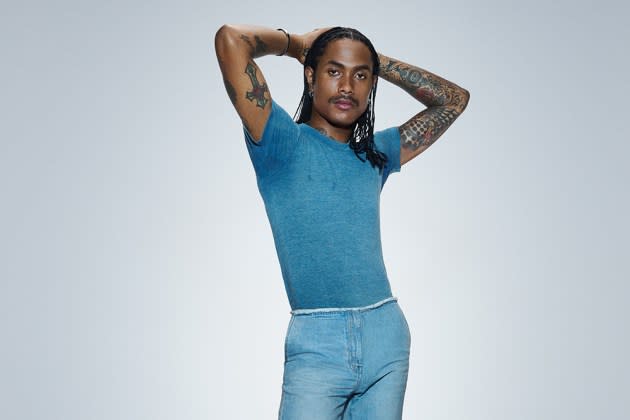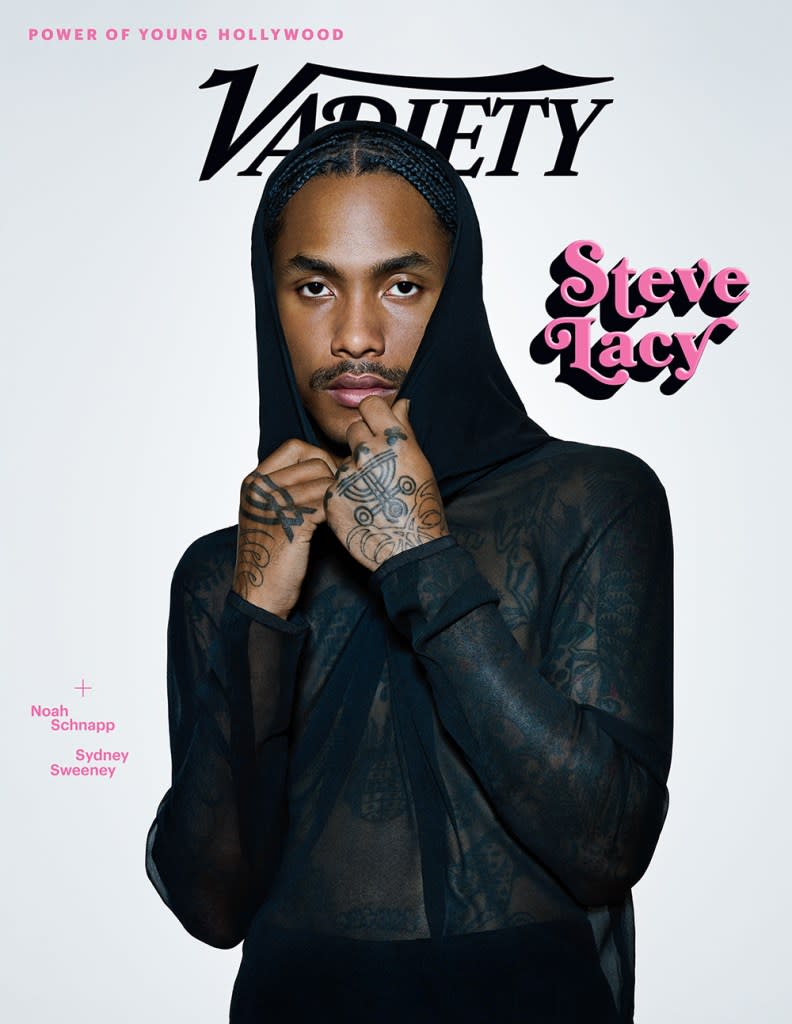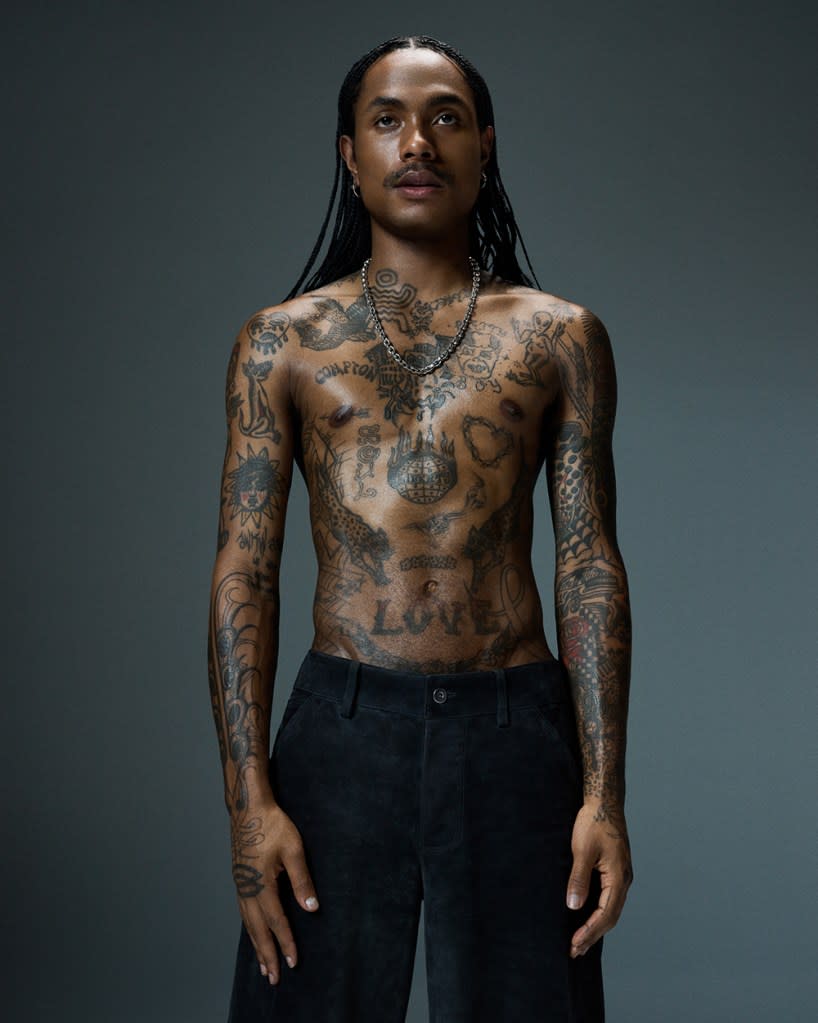‘I Feel Free’: Steve Lacy Confronts ‘Bad Habit’ Fame, Not Apologizing for That Camera Smash and Why Coming Out Is ‘Silly’
- Oops!Something went wrong.Please try again later.

One night, three years ago, while snaking through the dark bends of Topanga Canyon, Steve Lacy came face to face with death.
A drunk driver crashed into him at full speed atop the jagged cliffs connecting the valley and the beach outside Los Angeles. And though Lacy escaped his demolished Tesla Model 3 unharmed, for a brief moment before the collision, he accepted his fate.
More from Variety

“Being that close to death, I had the realization that you could be doing everything right, and then some fucking dumbass can crash into your car head-on,” he recalls. “And that could be it.”
The Compton-born “Bad Habit” singer, now 25, was then in the early stages of writing his first major label album, the follow-up to his solo debut, “Apollo XXI.” Did the near-death experience change his perspective on the record he was making?
Lacy considers for a moment, pushing his braids behind his ears, then shakes his head no. “But it brought me closer to it.”
In fact, the resulting album, “Gemini Rights,” centers on Lacy’s breakup with an ex-boyfriend. It’s an urgent concoction of R&B, rock and pop songs filled with jazzy guitars and buttery hooks, at once reminiscent of Stevie Wonder and Pharrell. Its breakout single, “Bad Habit,” became a global sensation, racking up nearly 100 million YouTube views and 1 billion Spotify streams. The album would go on to earn Lacy a Grammy Award and a No. 1 hit single — an unexpected bounty for an artist who, throughout our conversation, dismisses traditional measures of success and balks at the term “the industry.”
“I don’t think I’m in the industry. I know what it is, but I feel so far removed from it,” says Lacy, who nabbed the first of his six Grammy noms at age 17, as the youngest member of the neo-soul band the Internet. Since then, he’s collaborated with A-list artists including Kendrick Lamar; Tyler, the Creator; Vampire Weekend; Solange; J. Cole and Kali Uchis. Even now, after finally choosing a label partner in RCA, Lacy says not much has changed. He laughs at the idea that a label could impose deadlines on his creative workflow, and speaks proudly of turning down lucrative opportunities that didn’t feel “meaningful” to him. When asked whose guidance means the most to him, he says bluntly, “I don’t really like advice.”
Defiant words are easy for someone who accidentally created a TikTok phenomenon and one of the freshest No. 1 hits in years: “Bad Habit” is a shape-shifting song with four hooks, stripped of the antiseptic gloss that coats much of today’s radio fodder. Lacy finds his status as a chart-topper “fucking hilarious.”
“Labelheads felt strongly about it,” he says of the song. “I didn’t like it that much.”
Indeed, the track represents more than its commercial success. According to bass virtuoso Thundercat, one of Lacy’s biggest influences and most trusted collaborators, the song signifies a “win for the love of music” in an age of “heartlessness.”
“Steve is everything I hoped and dreamed for music,” Thundercat says. “He’s really out there playing and singing — and he’s Black, and he’s young. People want to hear real music, man. That’s why Steve Lacy is important: He represents something so much bigger than his little body can contain.”
While he generally navigated the frenzy of “Bad Habit” with aplomb, Lacy wasn’t prepared for the millions of rabid new fans it would bestow on him. Even now, he doesn’t carry himself like a famous person: He’s tall and striking, with tattoos crawling up his arms, but his slender frame is rendered formless by baggy brown pants and a thrifted red Gorillaz T-shirt. Here, in the courtyard of an upscale Manhattan hotel, no one is running up for autographs or selfies.
Yet, after years of playing chill shows for indie music snobs, he suddenly found himself stranded in a sea of screams and cellphone lights.
“At first, I was so thrown off,” he says, “because the Internet shows are more intellectual. It was cool shit.” He leans back with arms crossed, imitating an unimpressed hipster. “And now, it’s kids.”
One night last October, Lacy lost his cool.
As he performed “Bad Habit” in New Orleans, an audience member threw a disposable camera onstage, hitting him in the chest. Lacy cut the song short — but not before retrieving the fan’s camera and making a show of smashing it on the ground. After a series of incendiary headlines and social media hot takes, Lacy defended himself on Instagram but conceded, “Maybe I could’ve reacted better?”

“These moments just go viral,” he says now, opening up about the incident for the first time. “As soon as anything has virality to it, it’s like that’s everything you’ve done. That’s what I hated most about that moment.”
The camera smash was a rare, if understandable, outburst from an artist who is notoriously unbothered. It was also an early example of a concerning trend grabbing hold of live music: In recent months, Bebe Rexha, Harry Styles and Drake have all had cellphones and other items launched at them by audience members who will do anything for TikTok views.
Lacy chuckles. “People were pissed at me for it, but now they’re like, ‘He was fuckin’ right — y’all shoulda listened to Steve!’ I didn’t apologize for that shit because I’m not wrong!”
Still, he’s coming around to his young audience’s unstudied enthusiasm. “I had to accept that this is how these kids are,” Lacy says. “I was pissed at first — they want so much. Can you do this? Can you do that? I’m gonna throw this up here for you. I love you. But I don’t see them being wrong for it anymore. As much as it fucking annoys me sometimes, they’re just young. A lot of these kids — it’s their first concert, so they don’t even know what concert etiquette is. I’m starting to love them, and I couldn’t imagine my shows without them. They don’t give a fuck how uncool they look, and I appreciate that.”
He also abhors the perception that his concerts are filled with fans who only know one of his songs, accentuated by a viral video in which a crowd sings along emphatically to the hook of “Bad Habit” but falls dead silent during the following verse — a symptom of listening only to snippets of songs on TikTok.
“I hate that narrative. No, motherfucker!” he exclaims. “I’ve got mad hooks that everybody sings along to. Let me get the fucking record straight there: That happened at a couple shows, and only because I was doing too much, trying to get them to sing the whole verse. That was on me.”
He still gripes about younger fans watching entire shows from behind their iPhone screens, but he’s willing to put that aside as long as he can see their eyes. “If I’m gonna sing to you, let me sing to you,” he says. In Columbus, Ohio, Lacy did more than that, inviting a doppelgänger fan from the audience onstage to sing “Bad Habit.” A week earlier, in New York, Lacy shouted out kids pressed against the barricade, promising, “I don’t take any of this for granted.” It’s not lost on him that just a few years ago he was their age, spending his days idolizing Prince and scraping the internet for obscure Erykah Badu songs.
“It’s fucking dope that I get to develop these kids’ musical ears,” Lacy says. “I’ve grown to be super grateful for this rowdy, youthful craziness.”
Growing up in Compton, Lacy was surrounded by music. His mother was an aspiring singer, and she and his three sisters contribute backup vocals on both of Lacy’s albums. His own musical ambitions crystallized in the form of Guitar Hero, the popular video game that would inspire a generation of rock stars and wannabes to pick up real instruments. And at age 10, the same year his dad died, Lacy did just that. Years later, he joined the jazz ensemble at a South L.A. private high school, where, as a freshman, Lacy befriended an older kid named Jameel Bruner, who would change the course of his life.
Lacy and Bruner, a keyboardist (and younger brother of Thundercat), spent free periods jamming in the band room, until one day Bruner invited Lacy to meet his band: the Internet. Soon, Lacy was making beats with their producer, Matt Martians, and filling a role the band members didn’t know they needed: guitarist.
Early on, Lacy co-produced the beat to “Special Affair,” which would become the lead single for the Internet’s 2015 album “Ego Death.” “It was only right to make him a part of the band,” says Syd, the group’s lead singer. Lacy was still in high school, too young to even join the band on tour.
After producing more than half of the songs on “Ego Death,” he joined Syd as a lead vocalist on the Internet’s next album, 2018’s “Hive Mind.” And when he produced Kendrick Lamar’s song “Pride” entirely on an iPhone 6, Lacy seized the attention of the industry and cemented himself as a pioneer of music’s next generation.
He was also a teenager, still figuring out who he was and how to express it.
In 2017, the year he released his first solo project, “Steve Lacy’s Demo,” Lacy found himself chatting with fans on a Tumblr thread. When a commenter asked if he would date a guy, Lacy casually typed back, “Sure, why not.” Then the headlines popped up: “Steve Lacy Comes Out as Bisexual.”
“But I didn’t really come out,” Lacy says now. “I didn’t try to — it just kinda happened. I don’t care to announce who I’m into sexually. I think it’s silly. I never felt like I needed to come out.”
The experience also gave Lacy his first taste of online outrage. When, responding to a follow-up question, Lacy indicated he wasn’t interested in other Black men, he became the target of fan ire and blogs labeling him “anti-Black.” Lacy wrote at the time, “I’m just not attracted to Black boys. … I still love them and want them to do well in life, we just won’t date.”
It wasn’t until she saw the news that Syd, who had been out as gay for years, learned that Lacy was queer.
“I found out there was all that controversy, and that’s when I talked to him about it,” she says, retelling her most “profound” memory with her bandmate. The two were in New York and took a walk to Starbucks, where they had a heart-to-heart. But Syd, who is six years older than Lacy, knew her audience. She didn’t offer him advice about coming into his sexuality in front of the world — and Lacy didn’t ask for any.
“I think being a gay man is very different from being a gay woman,” Syd says. “I didn’t even want to assume that I knew what he was going through. I just wanted to let him know as a sister that you can play this as low-key or as high-key as you want to. It doesn’t matter, and whenever you’re ready to open up about it, we’re here.”
Lacy has since become more open about his sexuality — especially through his lyrics — but he exudes a certain ownership of self that makes him reluctant to attach labels. In an era when artists capitalize on their identities or are involuntarily defined by them, Lacy shrugs at the implication that his queerness informs his art, and he’s not concerned with representing a specific community either.
“I never care to speak for anyone else, because I think all of our experiences are so different from each other,” he says. “I guess I have a selfish perspective of myself in the world, and I’m just expressing myself. I’m not necessarily doing things for other people to feel good about themselves.”
Still, Lacy’s total ambivalence toward his sexuality is radical in its own way. For a chart-topping pop star to sing about his ex-boyfriend’s “deep throat” and “heavy dick” on one of 2022’s biggest albums and feel no need to explain is progress in itself.
A year on from “Gemini Rights,” Lacy is preparing the follow-up to his blockbuster major-label debut. It’s a pressure cooker, but he doesn’t feel the heat.
“I feel free,” he says, spreading his arms with an easy smile. “All the other shit happened. I went No. 1. I got the Grammy. I played at the Grammys — Beyoncé stood up. What more could I ask for?” He’s also not trying to conjure another “Bad Habit” for album three. “I’m making something completely new” is all he’ll say. “It’s still me, but… it’s way different.”
Eventually, the Internet will regroup for another album, but there’s no urgency — or jealousy from the other members about Lacy’s breakout fame.
“It’s been beautiful to see somebody take the infrastructure that we built together and reach the ultimate level of success,” Syd says. “I think subconsciously, I wanted it to go this way. I wanted somebody else to reach their full potential, to give me permission to do the same.”
Lacy is content with his “passive fame,” as he calls it: the kind that doesn’t yet require security but sparks whispers on the streets. To maintain his privacy, he’s made a pattern of warping his appearance, covering his face onstage and obscuring it on the cover of “Gemini Rights.”
“I didn’t put my face straight on the cover because I’m kind of afraid of what that’ll do,” he explains. “There’s still people I meet, and they have no idea it’s me until I say my name. I like that.”
Lacy is interested in acting, having taken his shot at a movie after a casting agent asked him to send in a self-taped audition. But he’s “scared” of the type of attention that comes with being on-screen. “I can go No. 1 and be on the radio and still go hang out,” he says. “If you go No. 1 on Netflix, you can’t do nothing! Movie star fame is way different.”
Still, for an artist who has enjoyed (or shied away from) the limelight for almost a decade, Lacy is slowly embracing a new level of celebrity.
“I don’t crave to be super famous, but I also try not to be afraid of that,” he says. Lacy pauses for a moment, leaning back in his chair to look up at the dozens of hotel windows hovering above him, glistening in the light like eyes, or camera lenses. “If that’s where things want to go.”
Set Design: Danielle Von Braun/Art Department; Grooming: Alexa Hernandez/The Wall Group; Cover Look: Top and pants: Saint Laurent
Best of Variety
Sign up for Variety’s Newsletter. For the latest news, follow us on Facebook, Twitter, and Instagram.

